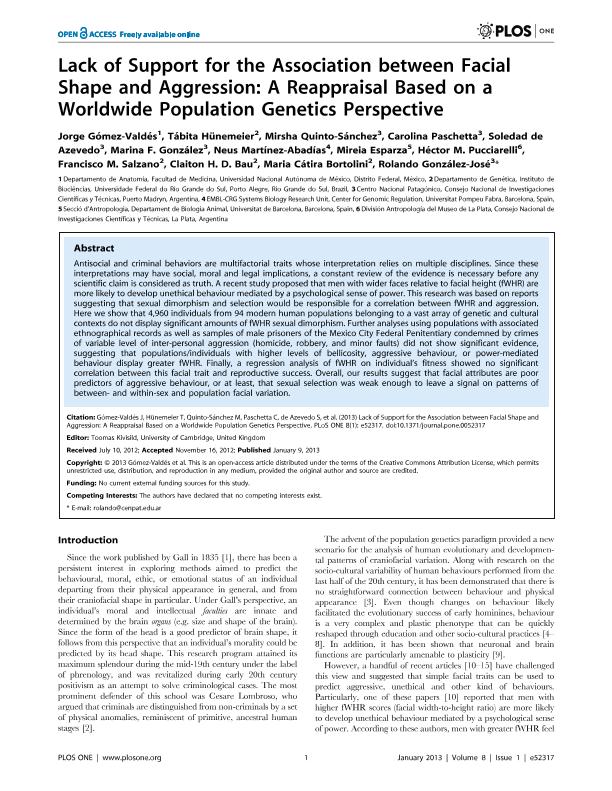Artículo
Lack of Support for the Association between Facial Shape and Aggression: A Reappraisal Based on a Worldwide Population Genetics Perspective
Goméz Valdés, Jorge; Hünemeier, Tábita; Quinto Sanchez, Mirsha Emmanuel ; Paschetta, Carolina Andrea
; Paschetta, Carolina Andrea ; de Azevedo, Soledad
; de Azevedo, Soledad ; González, Marina Fernanda
; González, Marina Fernanda ; Martínez Abadías, Neus; Esparza, Mireira; Pucciarelli, Hector Mario
; Martínez Abadías, Neus; Esparza, Mireira; Pucciarelli, Hector Mario ; Salzano, Francisco M.; Bau, Claiton H. D.; Bortolini, Maria Catira; González José, Rolando
; Salzano, Francisco M.; Bau, Claiton H. D.; Bortolini, Maria Catira; González José, Rolando
 ; Paschetta, Carolina Andrea
; Paschetta, Carolina Andrea ; de Azevedo, Soledad
; de Azevedo, Soledad ; González, Marina Fernanda
; González, Marina Fernanda ; Martínez Abadías, Neus; Esparza, Mireira; Pucciarelli, Hector Mario
; Martínez Abadías, Neus; Esparza, Mireira; Pucciarelli, Hector Mario ; Salzano, Francisco M.; Bau, Claiton H. D.; Bortolini, Maria Catira; González José, Rolando
; Salzano, Francisco M.; Bau, Claiton H. D.; Bortolini, Maria Catira; González José, Rolando
Fecha de publicación:
01/2013
Editorial:
Public Library of Science
Revista:
Plos One
ISSN:
1932-6203
Idioma:
Inglés
Tipo de recurso:
Artículo publicado
Clasificación temática:
Resumen
Antisocial and criminal behaviors are multifactorial traits whose interpretation relies on multiple disciplines. Since these interpretations may have social, moral and legal implications, a constant review of the evidence is necessary before any scientific claim is considered as truth. A recent study proposed that men with wider faces relative to facial height (fWHR) are more likely to develop unethical behaviour mediated by a psychological sense of power. This research was based on reports suggesting that sexual dimorphism and selection would be responsible for a correlation between fWHR and aggression. Here we show that 4,960 individuals from 94 modern human populations belonging to a vast array of genetic and cultural contexts do not display significant amounts of fWHR sexual dimorphism. Further analyses using populations with associated ethnographical records as well as samples of male prisoners of the Mexico City Federal Penitentiary condemned by crimes of variable level of inter-personal aggression (homicide, robbery, and minor faults) did not show significant evidence, suggesting that populations/individuals with higher levels of bellicosity, aggressive behaviour, or power-mediated behaviour display greater fWHR. Finally, a regression analysis of fWHR on individual's fitness showed no significant correlation between this facial trait and reproductive success. Overall, our results suggest that facial attributes are poor predictors of aggressive behaviour, or at least, that sexual selection was weak enough to leave a signal on patterns of between- and within-sex and population facial variation. © 2013 Gómez-Valdés et al.
Archivos asociados
Licencia
Identificadores
Colecciones
Articulos(CCT - LA PLATA)
Articulos de CTRO.CIENTIFICO TECNOL.CONICET - LA PLATA
Articulos de CTRO.CIENTIFICO TECNOL.CONICET - LA PLATA
Articulos(CCT-CENPAT)
Articulos de CTRO.CIENTIFICO TECNOL.CONICET - CENPAT
Articulos de CTRO.CIENTIFICO TECNOL.CONICET - CENPAT
Citación
Goméz Valdés, Jorge; Hünemeier, Tábita; Quinto Sanchez, Mirsha Emmanuel; Paschetta, Carolina Andrea; de Azevedo, Soledad; et al.; Lack of Support for the Association between Facial Shape and Aggression: A Reappraisal Based on a Worldwide Population Genetics Perspective; Public Library of Science; Plos One; 8; 1; 1-2013; e52317
Compartir
Altmétricas



